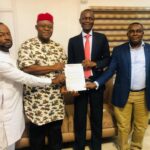…Applauds FG’s vaccination efforts
By Hassan Zaggi
The World Health Organisation (WHO) has warned that no one knows when a new COVID-19 variant will emerge, hence, called for concerted efforts by all to ensure wider vaccination coverage.
The Director, Immunization, Vaccines and Biologicals at WHO Headquarters, Dr Kate O’Brien, gave the warning during a visit to a health facility in Abuja, Nigeria, on Thursday.
She, however, applauded Nigerians for coming out willingly to the vaccination centres to get vaccinated with the COVID-19 vaccine.
Dr. O’Brien further stressed that for Nigeria to meet up with the 70% global target of COVID-19 vaccination coverage, more effort need to be put in place.
“You have all the materials and supply. What is left is for the people to understand how important it is to be vaccinated. This is important because we’ve seen the waves of variants. They come in every four months. Nobody know if there is going to be another variant. This is an opportunity for us to ensure that everybody is vaccinated.
“We, therefore, cannot afford to drop our guard. Regardless of where you live, or your age, you still need to get vaccinated when it’s your turn, with a complete course and booster dose if offered, and continue to take all the other preventive measures, both to protect yourself and others.
“Ending the pandemic requires us to get to much higher levels of vaccination in key target groups and it must include getting all vulnerable individuals and health care workers vaccinated as a priority,” says Dr. O’Brien .
She commended both mothers and fathers for coming out in their numbers to the clinic with their children for immunisation.
Responding to questions from journalists after assessing the health facility, the WHO Regional Immunization Advisor for Africa, Dr Richard Mihigo, appealed to the federal government to heighten the surveillance system and increase coverage for polio vaccination in order to protect children.
He advocated for the need for the concerned authorities to vigorously tackle the issue of misinformation, stressing that, part of their visit to Nigeria was to work with the authorities to understand the challenges and barriers hindering the acceptance of the vaccine.
“Additionally, misinformation and disinformation fuel mistrust. This puts health and lives at risk; undermines trust in science, institutions and health systems; and hinders the response to the pandemic.
“Whenever misinformation and disinformation clash with evidence-based science, another person is impeded from making the right decisions to protect their health.
“On our part, we are working with the authorities to understand the barriers and challenges. How the international community will work with government to overcome them,” he said.
Speaking earlier, the Director, Primary Healthcare System at the National Primary Healthcare Development Agency (NPHCDA), Dr Nneka Onwu, identified some of the challenges confronting vaccination efforts in Nigeria, among others included epileptic power supply for vaccine storage and insufficient funding.



